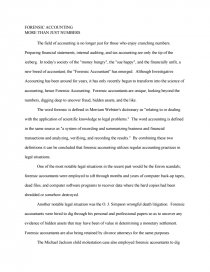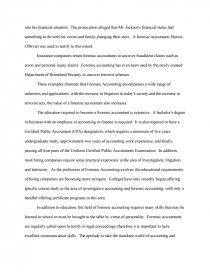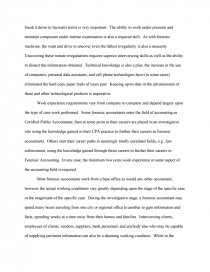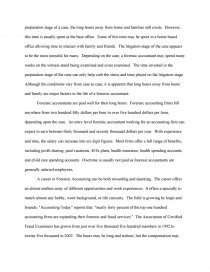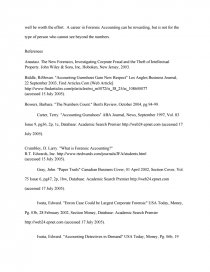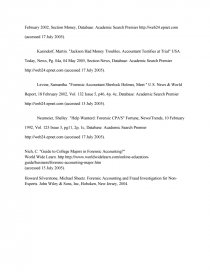Forensic Accounting
Essay by review • December 27, 2010 • Research Paper • 1,586 Words (7 Pages) • 2,227 Views
FORENSIC ACCOUNTING
MORE THAN JUST NUMBERS
The field of accounting is no longer just for those who enjoy crunching numbers. Preparing financial statements, internal auditing, and tax accounting are only the tip of the iceberg. In today's society of the "money hungry", the "sue happy", and the financially unfit, a new breed of accountant; the "Forensic Accountant" has emerged. Although Investigative Accounting has been around for years, it has only recently begun to transform into the science of accounting, hence Forensic Accounting. Forensic accountants are unique, looking beyond the numbers, digging deep to uncover fraud, hidden assets, and the like.
The word forensic is defined in Merriam Webster's dictionary as "relating to or dealing with the application of scientific knowledge to legal problems." The word accounting is defined in the same source as "a system of recording and summarizing business and financial transactions and analyzing, verifying, and recording the results." By combining these two definitions it can be concluded that forensic accounting utilizes regular accounting practices in legal situations.
One of the most notable legal situations in the recent past would be the Enron scandals; forensic accountants were employed to sift through months and years of computer back-up tapes, dead files, and computer software programs to recover data where the hard copies had been shredded or somehow destroyed.
Another notable legal situation was the O. J. Simpson wrongful death litigation. Forensic accountants were hired to dig through his personal and professional papers so as to uncover any evidence of hidden assets that may have been of value in determining a monetary settlement. Forensic accountants are also being retained by divorce attorneys for the same purposes.
The Michael Jackson child molestation case also employed forensic accountants to dig into his financial situation. The prosecution alleged that Mr. Jackson's financial status had something to do with his victim and family changing their story. A forensic accountant, Duross O'Bryan was used to testify to this extent.
Insurance companies retain forensic accountants to uncover fraudulent claims such as arson and personal injury claims. Forensic accounting has even been used by the newly created Department of Homeland Security to uncover terrorist schemes.
These examples illustrate that Forensic Accounting encompasses a wide range of industries and applications; with the increase in litigation in today's society and the increase in terrorist acts, the value of a forensic accountant also increases.
The education required to become a forensic accountant is extensive. A bachelor's degree in business with an emphasis in accounting or finance is required. It is also required to have a Certified Public Accountant (CPA) designation, which requires a minimum of five years undergraduate study, approximately two years of accounting work experience, and finally passing all four parts of the Uniform Certified Public Accountants Examination. In addition, most hiring companies require some practical experience in the area of investigation, litigation, and testimony. As the profession of Forensic Accounting evolves, the educational requirements of hiring companies are becoming more stringent. Colleges have only recently begun offering specific course study in the area of investigative accounting and forensic accounting, with only a handful offering certificate programs in this area.
In addition to education, the field of forensic accounting requires many skills that may be learned in school or must be brought to the table by virtue of personality. Forensic accountants are regularly called upon to testify in legal proceedings; therefore it is important to have excellent communication skills. The aptitude to take the mundane world of accounting and break it down to layman's terms is very important. The ability to work under pressure and maintain composure under intense examination is also a required skill. As with forensic medicine, the want and drive to uncover even the littlest irregularity is also a necessity. Uncovering these minute irregularities requires superior interviewing skills as well as the ability to dissect the information obtained. Technical knowledge is also a plus; the increase in the use of computers, personal data assistants, and cell phone technologies have (in some cases) eliminated the hard copy paper trails of years past. Keeping up-to-date in the advancement of these and other technological products is imperative.
Work experience requirements vary from company to company and depend largely upon the type of case work performed. Some forensic accountants enter the field of accounting as Certified Public Accountants; then at some point in their careers are placed in an investigative role using the knowledge gained in their CPA practice to further their careers as forensic accountants. Others start their career paths in seemingly totally unrelated fields, e.g., law enforcement, using the knowledge gained through those careers to further their careers in Forensic Accounting. In any case, the minimum two years work experience in some aspect of the accounting field is required.
Most forensic accountants work from a base office as would any other accountant; however the actual working conditions vary greatly depending upon the stage of the specific case or the magnitude of the specific case. During the investigative stage; a forensic accountant may spend many hours traveling from one city or regional office to another to gain information and facts, spending weeks at a time away from their homes and families. Interviewing clients, employees of clients, vendors, suppliers, bank personnel, and anybody else who may be capable of supplying pertinent information can also be a daunting working condition. While in the preparation stage of a case, the long hours away from home and families still exists. However, this time is usually spent at the base office. Some of this time may be spent in a home based office allowing time to interact with family and friends. The litigation stage of the case appears to be the most stressful for many. Depending on the case, a forensic accountant may spend many weeks on the witness stand being examined and cross examined. The time invested in the preparation stage of the case can only help curb the stress and time placed on the litigation stage. Although the conditions vary from case to case, it is apparent that long hours away from home and family are major factors in the life of a forensic accountant.
Forensic accountants are paid well for their long hours.
...
...
